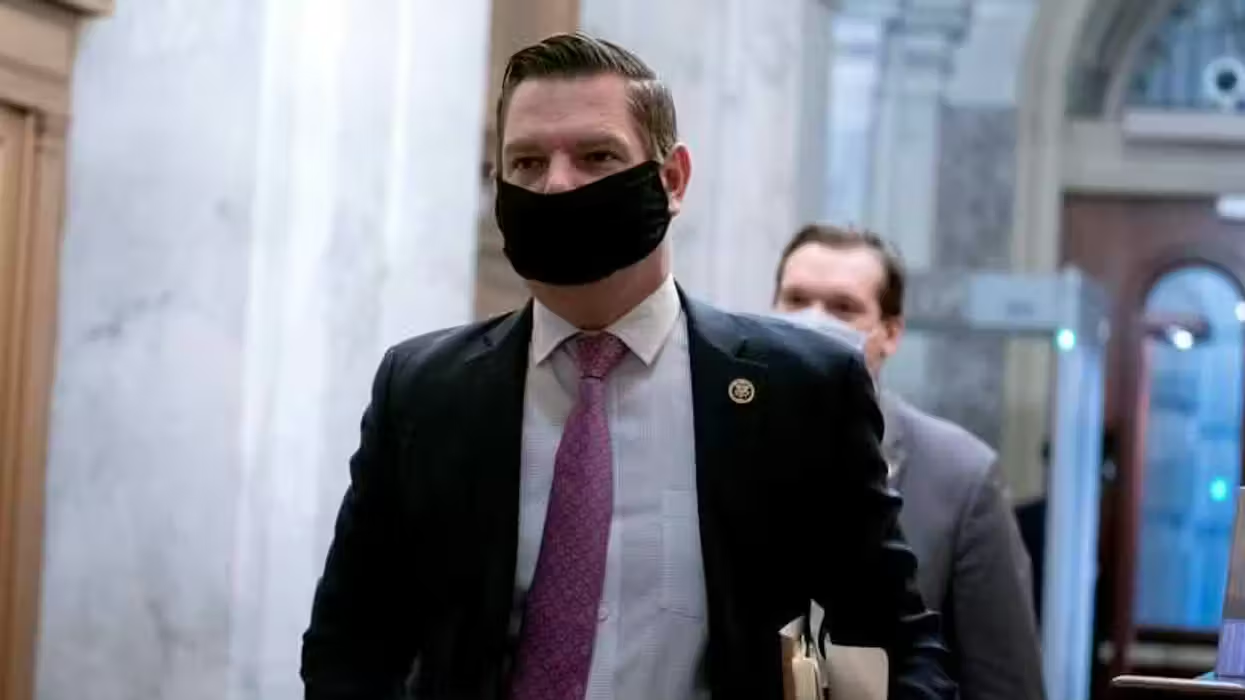WASHINGTON (AP) -- Financial markets were watching, the retirement accounts of millions of Americans on the line.
Nervous senators were watching too, well aware that political fortunes could be on the line.
So on perhaps the most important vote of the year, the Senate did something extraordinary this week: It tried to keep the vote tally secret until the outcome was assured.
As lawmakers voted Wednesday on must-pass legislation to increase the government's debt limit, they dropped the parliamentary equivalent of a curtain on the voting as it was in progress.
Typically, roll-call votes in the Senate play out in a very public manner. People watching from the galleries or tracking action from afar via C-SPAN can watch democracy unfold in all its messy wonder.
Each senator's vote is announced by the clerk; each time a senator switches sides, that's announced too. Onlookers can keep a running tally of how it's going.
But not this time. Fifteen minutes into the vote, as captured by C-Span cameras, the tally clerk rose to recite the vote. A Senate aide alerted Sen. John McCain, R-Ariz., one of the six Republicans who later switched his vote from "nay" to "aye." McCain intervened, and the clerk sat right back down. "Would you ..." McCain said before the live microphone cut off.
 (AP Photo/J. Scott Applewhite, File)
(AP Photo/J. Scott Applewhite, File)
A McCain spokesman denied the Arizonan intervened. "McCain didn't know that they weren't going to read the names and he didn't care if they did. He didn't have input on that," emailed spokesman Brian Rogers.
Senate leaders hoped they would get the necessary votes ultimately, but they were worried at the time and faced financial and political repercussions if the vote cratered in public view.
Both sides were concerned that investors might panic, causing the stock market to tank in real time. That's what happened in 2008 when the House voted to reject a Wall Street bailout plan, triggering a 7 percent drop in the Dow Jones Industrial Average.
Skittish Republicans had an additional concern: They knew the Democratic-backed legislation couldn't move forward without at least a few GOP votes, but none of them wanted to be left hanging out there alone on what could be a politically treacherous vote.
Whatever the reason, they kept the public in the dark while they worked things out. A Democratic spokesman later explained that Republicans requested the clerk stay silent so it would be easier for GOP senators to switch their votes.
No more announcing each individual "yea" and "nay." The running tally was known only by a handful of insiders.
What was clear, though, as the vote dragged on well beyond the allotted 15 minutes, was that Republicans were reluctant to help Democrats overcome a filibuster by Texas Sen. Ted Cruz, a Republican and tea party favorite who set out to keep the Senate from even voting on the actual debt measure.
It takes 60 votes to break a filibuster, and the count was stuck at 58. The debt limit measure teetered on the brink of failure.
Cruz's insistence on getting 60 votes prevented the bill from being passed with a simple majority in the 100-member Senate. Had he not objected, the 53 Democrats and two independents who align themselves with Democrats could have done it by themselves without forcing any Republicans - particularly those up for re-election this year - to cast politically painful votes.
 Sen. Ted Cruz (AP Photo/J. Scott Applewhite)
Sen. Ted Cruz (AP Photo/J. Scott Applewhite)
But now the filibuster vote was on. And the only way to know where the tally stood was to sit in the Senate chamber and track the vote of every senator, typically made with just a hand gesture.
It's a challenging task for even the most accomplished Senate watcher to perfect.
Nervous Wall Street traders and other interested observers were out of luck as the voted dragged on for more than an hour.
Financial markets floated softly southward as suspense built.
"We were very disappointed that Wednesday's change in Senate voting protocol kept us from giving the public real time access to this key vote," said Terry Murphy, C-SPAN's vice president of programming. "The tactic certainly gives the concept of legislative transparency a black eye."
Afterward, there was confusion. Initially, a spokesman for Majority Leader Harry Reid, the Nevada Democrat who runs the Senate, said Reid was unaware at the time that Senate procedures were being bypassed. Later, spokesman Adam Jentleson said Reid "consented to Republicans' request."
While acknowledging the media's concerns had merit, Jentleson couldn't guarantee a veiled vote won't happen again.
"After the vote began, it was quickly clear that Republican leaders were struggling to deliver enough votes ... and a potentially catastrophic default suddenly seemed possible," Jentleson said. "At Senate Republicans' request, the clerk did not call the names during the vote to make it easier for Republican leaders to convince their members to switch their votes."
So GOP leaders struggled to find the five GOP votes needed to help the Democrats overcome Cruz' filibuster.
Reporters crowding the chamber took to Twitter to describe the action, but the Senate was officially silent.
The decisive moment came when top Republicans Mitch McConnell of Kentucky and John Cornyn of Texas, both up for re-election this year, stepped to the well of the Senate and voted "aye."
That appeared to put the tally at the required 60, but no one could be positive.
Had a Democrat skipped the vote to get out of town ahead of a looming snowstorm? Did the press gallery staff members who unofficially record each tally as a service to the media miss a crucial hand gesture in the initial flurry of votes?
A few minutes later, photocopies of the official tally arrived in the press gallery, showing that six Republicans had switched their votes in solidarity with McConnell, who faces a tea party challenge in a May primary.
The final vote - 67-31 - was posted on the Senate's web site. But information on who switched votes isn't available there.
"We are extremely concerned with the way the vote tally was handled yesterday on a pivotal debt-ceiling vote," said Siobhan Hughes, chairwoman of the Standing Committee of Correspondents, which represents the interests of Capitol Hill's print media. "When the vote tallies are not read aloud, it makes it harder for the media and therefore the public to get the information they need to hold lawmakers accountable."
The day's dramatic turn of events played out at a time when every action has taken on added significance because control of the Senate hangs in the balance. Some Republicans found themselves weighing their votes with one eye on the November elections and the other on primary-election challengers from the right.
It will take a net gain of six seats for Republicans to retake the chamber, something campaign watchers say is within reach.
McConnell, whose seat is one of the few controlled by Republicans that could flip to Democrats, was clearly loath to vote yes.
Predictably, he was blasted after the vote by hard right conservatives.
Cornyn, who initially voted "nay", switched to an "aye" right after McConnell, putting him squarely at odds with Cruz, his Texas colleague.
That the top two Republicans voted to advance the measure could take some of the sting out of the vote for embattled Democrats.
But it didn't placate those who felt the whole thing played out without the transparency such an important vote deserved.

 (AP Photo/J. Scott Applewhite, File)
(AP Photo/J. Scott Applewhite, File)





